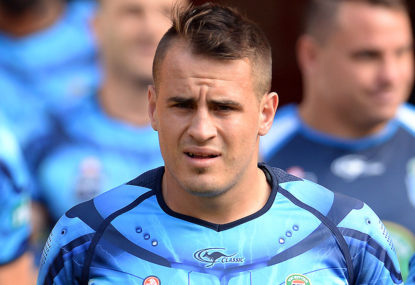NRL News: Richo knocks back Souths to ink long-term Tigers deal, kick-offs 'close to a change soon'
Shane Richardson has inked a four-year deal to lead the Wests Tigers, confirming himself in a permanent role after taking the CEO's job on…

Des Hasler complained in wash-up of the Bulldogs’ last start loss to Parramatta that something needed to be done to ensure that clubs were not forced to field weakened sides during Origin.
Des is not the first to make this complaint and he won’t be the last. Like those before him, Hasler was happy to complain about the situation but intimated it was the job of others to come up with a solution.
With regards to Origin, two things are certain.
1. It is the most valuable and best supported feature of the NRL and it continues to grow from year to year;
2. None of the current scheduling alternatives are supported by fans, despite the consensus being “that something has to be done”.
With regards to point two, I note the last time Origin was shifted was to Sunday nights in 2001. Fans were disgusted to have no club football and the experiment was canned after a year.
Origin thrives on history and tradition.
It has been played on Wednesday nights for an extended period now (despite having been played on every night of the week in days gone by). It must stay on Wednesday nights.
There must be another solution. Here are a few ideas.
1) Explore alternative TV broadcasting arrangements during Origin
The problem the NRL faces is that it is at the mercy of television. It sells the TV rights for big money but the act of doing so gives fans a disincentive to attend matches. This is exacerbated during Origin, when star players are absent.
The NRL lacked foresight when it negotiated the last TV rights deal in 2012. The future success of the sport is intimately connected to crowd attendances. Average crowd figures have stagnated over the past 10 years.
The game is not growing unless more people attend matches. When people attend matches in greater number, the product invariably improves. The NRL does not prioritise gate receipts over TV money. If it did, low rating matches would be blacked out or shown on delay to get fans to attend.
American sports administrators still black out coverage as a means of generating attendances. This may only apply in small market cities where stadiums are not likely to be sold out every game. In Australia, we don’t hear about Florida Panthers fans having to buy pay per view to watch their NHL team’s home game. Its only a small market team. This used to happen in the NRL, especially at finals time.
Why don’t we bring it back?
2) Increase the second tier salary cap
Last weekend’s newspapers were spruiking the story of new Canterbury half Damien Cook, the barman turned NRL player. How can Cook be expected to perform at first grade standard when he is pouring beers for 30 hours a week to supplement his footy income?
If the NRL reduced the disparity between the highest and lowest paid players, then the standard of matches would not fall away so significantly during Origin.
3) Reduce the interchange
Rugby league needs to become a test of stamina again. This would allow players like Damien Cook (who perhaps have the skills but not the god-given size) to match it with larger players like Jarryd Hayne and Greg Inglis each week. Reducing interchange may also lead to a long-term reduction in injuries, given the intensity of hits would subside as players fatigue.
Sides like Cronulla have been have been decimated by injuries. Their reserves have produced a poor standard of football and consequently lost matches.
4) Indoor stadiums
Out of left field this one, but clearly a must long term, especially given the thrills Dunedin sports fans have had since their indoor stadium was completed. Anyone who watched the All Blacks versus England game last Saturday would appreciate the product was far superior than that which the old Carisbrook dished up on a wet winters evening in days gone by.
Indoor stadiums driver a better product and attract better attendances for winter sports.